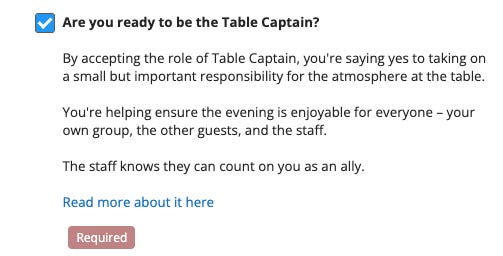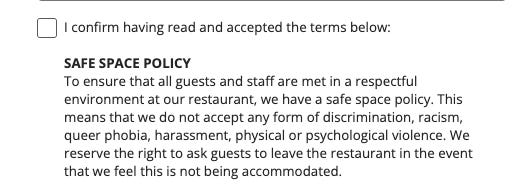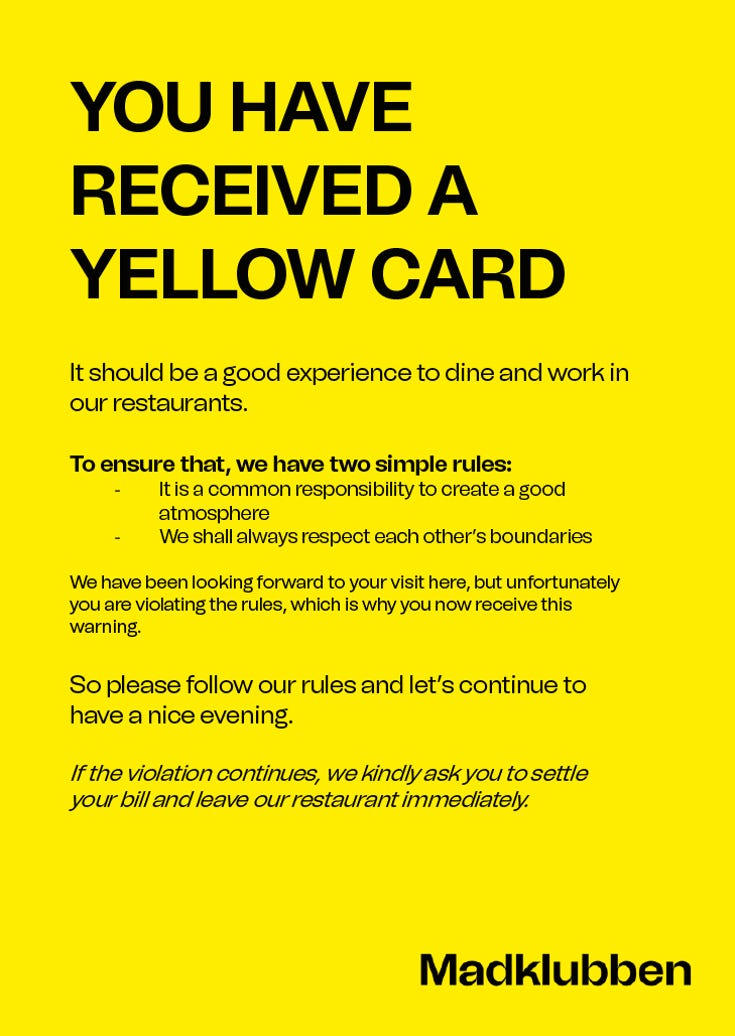Will you be my table captain?
A restaurant asks for confirmed allies at the time of booking. Is it too much?
A well-known fashion writer wanted to book a table at Lamar, a Copenhagen restaurant, during the city’s August fashion week. It was a digital booking-as-usual until she reached the final screen. There, she was confronted with an unusual request:
Ticking the box was required to book the reservation.
Sorry, the what?
It happened to Farrah Storr, an ex-magazine editor based in London. Storr writes a Substack newsletter called Things Worth Knowing with close to 60,000 subscribers. She also works as Substack’s head of writer partnerships in the UK. After encountering the table captain prompt, Storr posted a photo of the booking page on Substack’s Notes platform.
“If sharing plates weren’t enough to deal with, what short of fresh new hell is THIS?” she asked her followers. “Introverts may never eat out again.”
Initially, I agreed. Absolutely not, I thought. (I posted about it, too, to my less-than-60,000 followers.) Introverts unite!
The commenters agreed. Actress Jameela Jamil responded, “This is the worst thing I have ever seen.” Others labeled the request “emotional labor” and unpaid work.”
But then I got curious. Is this a Danish thing? Did something happen to require this? Are other restaurants following suit? Did the reservations platform suggest it? And should we expect it to happen more often?
In this case, the restaurant added the request.
Simon Leo Hansen, owner of Lamar and sister restaurants Safari, Omar, and Kima in Copenhagen, told Danish press earlier this year that he added the language to his booking pages after noticing more diners — male, usually — behaving inappropriately toward female staff. Sometimes, Hansen said, it was bad enough that he called diners the next day, banning them from reentering the restaurant. Guest feedback about the prompt had been largely positive, though he still worried it could be seen as contentious.
(I used Google to translate the text of the article; I’m paraphrasing so as not to misquote him.)
With this context, the restaurant’s request seems more reasonable, less requisite.
But… I still feel conflicted, so I asked around.
“I don’t think assigning a ‘table captain’ is asking diners to do additional work or extra labor. It’s simply expecting accountability, which all mindful guests should exhibit every time they dine out in a restaurant,” says Adam Reiner, author of the forthcoming book The New Rules of Dining Out. (It comes out tomorrow!)
Having a designated point person at a table makes it easier for the staff, he told me, citing his own experience as a waiter in upscale New York City restaurants including Babbo and Carbone. At Carbone, where dishes are served family-style, it was the server’s job to discern the table’s “boss” — the diner who’d take the lead. Without a clear leader, he says, it’s hard to keep the table focused.
Still, Reiner told me, “There’s no reason why restaurants shouldn’t expect every table to monitor and regulate its own behavior, especially any improprieties directed at its employees.”
But a written contract may be extreme. “It seems like a big ask to expect the poor sap in mid-level management who made the reservation to confront the president of the company at a business dinner about their questionable behavior,” he says.
When I asked, a rep for the reservations platform said the request isn’t typical, but the sentiment is gaining traction.
Lamar and its sister restaurants use software from UK-based EasyTable to accept online reservations. An EasyTable support rep told me they weren’t aware of other restaurants recruiting “table captains” at the time of booking, but said that so-called “safe space” policies have been showing up in cities like Copenhagen.
Madklubben, a large and unmissable restaurant group in Denmark (I think I ate my first-ever dinner in Copenhagen at a Madklubben a decade ago) has a “safe space policy” inside its reservation terms. The terms bans harassment and violence and are listed alongside other policies about reservation changes, arrival times, and payments. Diners must agree to it before booking.
The policy builds on a previous effort; in 2021 the group introduced a yellow card — like in soccer — which it issues to diners who harass staff. If the behavior continues, the card warns, they’ll be asked to leave.
While these direct measures may seem extreme, they aren’t unreasonable.
Restaurant etiquette has evolved, especially since the pandemic. Employees are more empowered to call out bad behavior, even amid rising tensions and stress in [gestures broadly] daily life. I can’t find good data on bad restaurant behavior, but recent info from the International Air Transport Association suggests that incidents of unruly and disruptive passenger behavior on flights are rising. It’s easy to see the parallel between in-flight misconduct and dining room drama.
Bad restaurant behavior seems prevalent enough to keep talking about. For the rule-following altruists among us, Reiner dedicates a section in his book to dealing with tablemates that mistreat staff. He recommends discreetly approaching the server to quickly acknowledge the situation and apologize on behalf of the offender. Taking ownership of the bad behavior, Reiner says, can go a long way toward diffusing the situation.
Storr, she later posted, chose to dine somewhere else.







Without going so far as to be rude to staff, patrons coming to a restaurant in yoga pants or sweatpants is my pet peeve... I blame Uber Eats for making people believe they can dine out like they do at home!